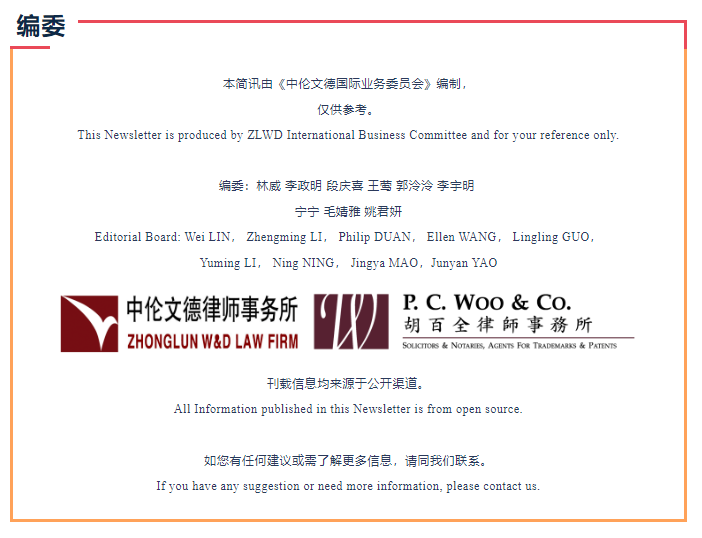
NEWS

NEWS

Reciprocal Recognition and Enforcement of Civil and Commercial Judgments between Hong Kong and the Mainland
On November 10, 2023, the Hong Kong Special Administrative Region Government announced that the Mainland Judgments in Civil and Commercial Matters (Reciprical Enforcement) Ordinance (Chapter 645) (hereinafter referred to as the "Ordinance") and the Mainland Judgments in Mutual Enforcement of Civil and Commercial Matters Rules (hereinafter referred to as the "Rules") will come into effect on January 29, 2024.
The Ordinance aims to implement the Arrangement on Reciprocal Recognition and Enforcement of Civil and Commercial Judgments between Hong Kong and the Mainland (hereinafter referred to as the "Arrangement") in Hong Kong. It sets out mechanisms in Hong Kong for the registration of Mainland civil and commercial judgments and for applying to Hong Kong courts for certified copies and certificates of Hong Kong civil and commercial judgments, facilitating parties in seeking recognition and enforcement of relevant judgments in the Mainland. To support the operation of the mechanism prescribed under the Ordinance, the Chief Judge of the High Court made the Rules under section 35 of the Ordinance. The provisions of the Rules cover, among other things, the practice and procedure relating to the application and enforcement of registered judgements under the Ordinance, as well as the fees payable under the Ordinance. In the Mainland, the Supreme People's Court will issue judicial interpretations regarding the implementation of the Arrangement.
A spokesperson for the Department of Justice of the SAR Government stated that the Ordinance and the Rules establish a more comprehensive mechanism for the mutual recognition and enforcement of civil and commercial judgments between Hong Kong and the Mainland. This aims to reduce the need for parties to repeatedly initiate litigation in both places regarding the same dispute, thereby providing better protection for the interests of the parties involved.
"Report on use of ESG contractual obligations and related disputes" has been Released.
On October 30, 2023, the Environment, Social and Governance (ESG) Subcommittee established by the International Bar Association (IBA) Arbitration Committee released a report titled "Report on use of ESG contractual obligations and related disputes."(hereinafter referred to as the 'Report')
The Report outlines corporate responsibilities concerning environmental, social, and governance aspects, elucidating clauses related to ESG in commercial contracts and investment agreements. It analyzes dispute resolution methods concerning environmental, social, and governance obligations. The Report highlights that arbitration is commonly utilized as an alternative to litigation, where parties agree to have disputes resolved by a designated arbitrator or tribunal, whose decisions are binding on the involved parties. ESG disputes can be arbitrated based on relevant investment agreements, or parties may submit ESG disputes to arbitration as per arbitration agreements. Given the confidentiality inherent in arbitration, it is likely to emerge as the most favored mechanism for resolving ESG disputes.
The Fujian Province Cross-Strait Maritime Dispute Resolution Center has been Established.
On November 9, 2023, the Fujian Province Cross-Strait Maritime Dispute Resolution Center (hereinafter referred to as the "Center") was officially established in Xiamen. As the first cross-strait maritime dispute resolution center in the country, the Center will utilize administrative, judicial, arbitration, industry, mediation organizations, insurance, and related expert teams. It will focus on disputes concerning crew rights, waterway accidents, salvage of sunken ships or navigational obstacles, various maritime commercial contract fulfillments, compensation for personal injuries in maritime passenger transport, port construction and operations, and emerging cross-strait industries. The Center aims to provide a "one-stop" legal service offering maritime legal consultations, public legal education, dispute resolution, and other services for Taiwanese residents and businesses.
Furthermore, the Center will explore innovative legal services for cross-strait maritime affairs, promote the establishment of diverse dispute resolution mechanisms, enrich experiences in public legal services concerning cross-strait affairs, provide legal support for economic and trade exchanges and close personnel interactions across the strait, and aid Fujian's exploration of new paths for integrated development across the strait and the construction of a demonstration zone for cross-strait integrated development.
Beijing Fourth Intermediate People's Court:
Affirmation of Third-Party Funding in Arbitration
Legal Basis:
"The Arbitration Law of the People's Republic of China"
Article 70
Where a party can provide evidence showing that the foreign arbitration award was made in any of the circumstances described in Article 260 (1) of the Code of Civil Procedure of the People's Republic of China, the award may, following examination and verification by a collegiate bench of the People's Court, be cancelled.
"The Civil Procedure Law of the People's Republic of China"
Article 281
For an arbitral award made by a foreign-related arbitration organisation of the People's Republic of China, where the respondent presents evidence to prove that the arbitral award falls under any of the following circumstances, upon examination and verification by the collegiate bench formed by the People's Court that the assertion is true, the People's Court shall rule on non-enforcement:
(1) The parties concerned have not included an arbitration clause in the contract or reached a written arbitration agreement subsequently;
(2) The respondent has not received a notice from the designated arbitrators or notice on arbitration procedure, or the respondent is unable to make representation due to any reason not attributable to the respondent;
(3) The composition of the arbitral tribunal or the arbitration procedure does not comply with the arbitration rules; or
(4) The arbitration matter does not fall under the scope of the arbitration agreement or the arbitration organisation has no right to carry out arbitration.
Where a People's Court deemed that enforcement of the arbitral award violates public interest, the People's Court shall rule on non-enforcement.
Case Description:
On December 7, 2021, the China International Economic and Trade Arbitration Commission (hereinafter referred to as "CIETAC") issued Arbitration Award (2021) CIETAC BJ Award No. 3192 (hereinafter referred to as the "Arbitration Award"). The Arbitration Award indicated that Ruili Airlines Co., Ltd. (hereinafter referred to as "Ruili Airlines") failed to obtain the approval from the National Development and Reform Commission by the delivery date and take delivery of Aircraft MSN60177. Additionally, it failed to make the due payments to China Banking Aircraft Leasing (Tianjin) Co., Ltd. (hereinafter referred to as "China Banking Aircraft Company"). Consequently, this led to cross-defaults and substantial breaches of the Lease Agreements under clause 19.1.10 (d) of Lease Agreements No. 60180 and No. 60181. Yunnan Jingcheng Group Co., Ltd. (hereinafter referred to as "Yunnan Jingcheng Company") and Mr. Dong failed to fulfill the obligations of Ruili Airlines under these agreements as requested by China Banking Aircraft Company, violating the guarantee agreements related to Aircraft MSN60180 and MSN60181. On June 27, 2018, China Banking Aircraft Company formally terminated Lease Agreements No. 60180 and No. 60181.
On June 6, 2022, Ruili Airlines, Yunnan Jingcheng Company, and Mr. Dong (hereinafter referred to collectively as the "Applicants") requested the Fourth Intermediate People's Court of Beijing (hereinafter referred to as the "Court") to lawfully revoke the CIETAC Arbitration Award. The Applicants stated: 1. The composition of the arbitration tribunal did not comply with arbitration rules; arbitrator Mr. Chen (Rollin Chan) appointed by China Banking Aircraft Company had significant interests with the third-party funding institution IMF Bentham Limited, which were not disclosed, nor did he proactively recuse himself. This situation was enough to affect the correct arbitration ruling and raise reasonable doubts about its fairness or independence. 2. Involvement of the third-party funding institution in the arbitration, being aware of the substance and procedures, might involve disclosures related to the case outcome due to the public nature of the listed companies. China Banking Aircraft Company and the arbitration tribunal violated the confidentiality principle of arbitration, warranting the revocation of the Arbitration Award.
Court’s View:
The Applicants presented specific reasons regarding the composition of the arbitration tribunal, whether it was inconsistent with the arbitration rules, and involved assessments of the third-party funding institution's conduct, arbitrator disclosure obligations, and violation of recusal provisions. Existing laws do not prohibit third-party funding institutions from supporting parties in arbitration. The conduct of third-party funding institutions and the arbitrator's association with them are crucial for the credibility of the arbitration and the fairness of the arbitral award. Therefore, the Court analyzed the arbitrator's disclosure of information, compliance with recusal provisions, and the third-party funding institution's disclosures in the arbitration.
On one hand, when there are affiliations in social life and interactions that do not reach the threshold to influence the independent and fair arbitration and when the arbitrator is unaware of these relationships, it cannot be deemed that the arbitrator violated the disclosure obligations or the recusal procedural rules. Upon examination, the existing evidence in this case is insufficient to demonstrate that arbitrator Mr. Chen has any conflict of interest with the third-party funding institution involved in the case or any situation where recusal is required according to arbitration laws or rules, which could potentially affect a fair decision.
On the other hand, in civil activities, parties should follow the principle of voluntariness, establish, modify, and terminate civil legal relationships according to their intentions. Regarding the choice of arbitration by civil entities and the selection of third-party funding during arbitration, judgment should be based on the principle of autonomy with a legal foundation. Civil entities have the right to access quality legal services, such as hiring professional lawyers, consulting experts, etc., to safeguard their lawful rights. When civil entities choose arbitration to resolve disputes and contract for third-party funding, as long as these actions do not violate the law and do not affect the fairness of the arbitration decision, the legitimate choices reflecting the autonomy of civil entities should be respected.
Regarding whether the third-party funding institution violated the arbitration confidentiality rules, the Court analyzed the content of the arbitration rules regarding confidentiality. The key to arbitration confidentiality lies in the non-disclosure and non-publicity of case details to the public, maintaining the parties' business secrets and social image. The arbitration rules do not allow the disclosure of information to the "outside world" but do not restrict relevant individuals from accessing information. Since the existing arbitration rules do not prohibit third-party funding institutions from supporting arbitration parties, establishing a funding relationship with one party does not violate arbitration confidentiality rules. The current evidence in this case is insufficient to demonstrate a breach of confidentiality rules, leading to the disclosure of case substance and procedural details to society.
Therefore, in accordance with Article 70 of the Arbitration Law of the People's Republic of China and Article 281 of the Civil Procedure Law of the People's Republic of China, the Fourth Intermediate People's Court of Beijing ruled to dismiss the request of Ruili Airlines Co., Ltd., Yunnan Jingcheng Group Co., Ltd., and Mr. Dong Cheng to revoke the Arbitration Award (2021) CIETAC BJ Award No. 3192.
The Hong Kong High Court:
Refusal to Enforce Mainland Arbitration Award Due to Arbitrator Misconduct
Case Description:
In a dispute arising from a share purchase agreement, Mr. Song (hereinafter referred to as the "Applicant") and Mr. Li (hereinafter referred to as the "Respondent") referred the matter to arbitration at the Chengdu Arbitration Commission. On October 11, 2021, the Chengdu Arbitration Commission issued an award (hereinafter referred to as the "Award") directing the Respondent to pay RMB 337,222,219.90 to the Applicant.
On December 9, 2022, the Applicant sought enforcement of the Award in the Hong Kong High Court (hereinafter referred to as the "Court"). On December 28, 2022, the Respondent applied to the Chengdu Intermediate People's Court (hereinafter referred to as "Chengdu Intermediate Court") to set aside the enforcement of the Award. The Chengdu Intermediate Court rejected the application, reasoning that the contract in question was not illegal, and while Arbitrator Q's conduct led to procedural defects, it did not impact the second hearing. Additionally, the Arbitration Notices and documents were effectively served on the Respondent, and the Respondent's legal representative did not raise objections regarding the composition of the arbitral tribunal or the arbitration process.
On January 12, 2023, the Court issued an enforcement order for the Award. On January 26, 2023, the Respondent applied to the Court under Section 95 of the Arbitration Ordinance (Chapter 609) to set aside the enforcement order. The Respondent argued that Arbitrator Q's conduct deprived the Applicant of the opportunity to present its case fairly, which violated public policy.
Upon review, the Court found that Arbitrator Q participated in the hearing from an area with poor signal quality and did not attentively listen when both parties expressed their views.
Court’s View:
The Court's review principles in this case are as follows:
Firstly, mainland courts' recognition of the arbitration award in this case does not preclude the Hong Kong court from refusing enforcement based on a breach of public policy. If an arbitral award is recognized in one jurisdiction but enforcing it would violate the public policy of another, the court in that jurisdiction may refuse enforcement. These general principles do not contravene the Arbitration Ordinance or the arrangement regarding mutual enforcement of arbitral awards between the mainland and the Hong Kong Special Administrative Region.
Secondly, a violation of "public policy" refers to a breach of "fundamental conceptions of morality and justice" in the jurisdiction of the enforcing court. Additionally, the Hong Kong court's refusal to enforce an award on public policy grounds requires a substantial injustice arising from the award that would force the court to refuse enforcement; otherwise, it would go against the court's conscience.
Thirdly, under Hong Kong law, the principle of "audi alteram partem" or "hear the other side" is a fundamental aspect of natural justice and has been recognized and enforced. This principle implies that no person should be judged without a fair hearing in which each party is given the opportunity to respond to the evidence against it, and to be heard on its case. Additionally, as per Section 46(2) of the Arbitration Ordinance, all parties in arbitration must be treated equally. This means that during arbitration proceedings, the arbitral tribunal must act independently and treat all parties fairly, giving them a reasonable opportunity to present their case and address opposing arguments.
Based on the above, the Court ultimately supports the Applicant's argument regarding the inappropriate conduct of Arbitrator Q, specifically that Arbitrator Q's failure to genuinely participate in the second hearing violated the Applicant's right to a fair hearing. Enforcing the arbitration award in this case would contravene public policy.
In conclusion, the Hong Kong High Court ruled in favor of the Respondent, Mr. Li, supporting the request to set aside the enforcement order.


